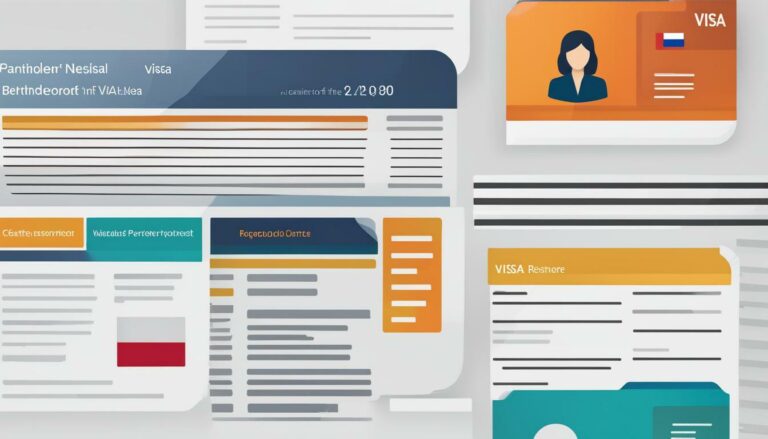Understanding the Language Requirements for Canadian Immigration
If you are planning to immigrate to Canada, it is crucial to understand the language requirements set by the Canadian government. The language requirements for individuals applying for permanent residence under the Canadian Experience Class or skilled worker immigration programs are based on the Canadian Language Benchmark (CLB). Meeting the minimum CLB level for each language ability, including speaking, reading, writing, and listening, is essential.
Key Takeaways
- Language requirements are crucial for Canadian immigration
- Canadian Language Benchmark (CLB) levels determine the minimum language abilities needed
- Language tests such as CELPIP General Test and IELTS General Training are approved for English proficiency
- Approved tests for French proficiency include TEF Canada and TCF Canada
- Language test scores are valid for two years
Importance of Language Proficiency for Canadian Immigration
Language proficiency plays a significant role in the Canadian immigration process, and it is assessed through approved language tests. In order to successfully immigrate to Canada under the Canadian Experience Class or skilled worker immigration programs, individuals must meet the language requirements set by Immigration, Refugees and Citizenship Canada (IRCC). These language requirements are based on the Canadian Language Benchmark (CLB) levels and encompass four language abilities: speaking, reading, writing, and listening.
Meeting the minimum CLB level for each language ability is crucial for individuals applying for permanent residence. The CLB levels determine the level of proficiency in English or French required to function effectively in daily life in Canada. It is important for applicants to understand the language requirements and prepare accordingly to improve their chances of a successful immigration application.
IRCC has approved specific language tests for assessing language proficiency. For English, the approved tests include the CELPIP General Test and IELTS General Training, while for French, the approved tests are TEF Canada and TCF Canada. These tests evaluate the individual’s language skills and provide a standardized measure of their proficiency level. It is important to note that language test scores are valid for two years, and if more than two years have passed since the test was taken, it needs to be retaken.
| Language Ability | Minimum CLB Level |
|---|---|
| Speaking | CLB 7 |
| Reading | CLB 6 |
| Writing | CLB 6 |
| Listening | CLB 6 |
Understanding and meeting the language requirements for Canadian immigration is essential for a successful application. Language proficiency not only enhances an individual’s ability to integrate into Canadian society but also improves their chances of finding employment and establishing a successful life in Canada. By preparing for and achieving the required language proficiency level, applicants can navigate the immigration process more effectively and increase their chances of a positive outcome.
Canadian Language Benchmark (CLB) Levels and Minimum Requirements
The Canadian Language Benchmark (CLB) levels determine the language proficiency required for successful Canadian immigration. Individuals applying for permanent residence under the Canadian Experience Class or skilled worker immigration programs must meet the minimum CLB level for each language ability, including speaking, reading, writing, and listening.
The CLB levels range from 1 to 12, with CLB 1 representing a basic level of proficiency and CLB 12 indicating an advanced level. Each language ability has its own minimum CLB level requirement, which varies depending on the immigration program. For example, the minimum CLB level for the Canadian Experience Class is CLB 7 for speaking and listening, and CLB 6 for reading and writing, while for the Federal Skilled Worker Program, it is CLB 7 for all language abilities.
It is important for individuals to understand the specific CLB level requirements for their desired immigration program and assess their own language skills accordingly. This will help them determine whether they meet the minimum language requirements or if they need to improve their proficiency before applying for Canadian permanent residence.
| Immigration Program | Speaking | Listening | Reading | Writing |
|---|---|---|---|---|
| Canadian Experience Class | CLB 7 | CLB 7 | CLB 6 | CLB 6 |
| Federal Skilled Worker Program | CLB 7 | CLB 7 | CLB 7 | CLB 7 |
By understanding the CLB levels and minimum requirements for language proficiency, individuals can better prepare themselves for the Canadian immigration process, ensuring they meet the necessary language benchmarks and increase their chances of successfully obtaining permanent residence in Canada.
Language Tests for English Proficiency
If you are planning to immigrate to Canada, you need to take an approved English language proficiency test. These tests are used to assess your proficiency in the English language, which is a key requirement for Canadian immigration. The two approved language tests for English proficiency by Immigration, Refugees and Citizenship Canada (IRCC) are the CELPIP General Test and IELTS General Training.
The CELPIP General Test is designed to measure your English language abilities in real-life situations. It assesses your listening, reading, writing, and speaking skills, and provides a reliable indication of your English language proficiency. The test is computer-delivered and offers test takers a realistic and convenient experience.
Similarly, the IELTS General Training test is widely accepted for Canadian immigration purposes. It evaluates your English language proficiency in a variety of everyday contexts. The test assesses your listening, reading, writing, and speaking skills, and provides a comprehensive evaluation of your English language abilities.
When taking either of these tests, it is important to familiarize yourself with the test format, content, and scoring criteria. This will help you prepare effectively and perform to the best of your abilities. Remember that language test scores are valid for two years, so if more than two years have passed since you last took the test, you will need to retake it.
CELPIP General Test
The CELPIP General Test is one of the approved English language proficiency tests for Canadian immigration. It assesses your proficiency in speaking, listening, reading, and writing skills. The test is computer-delivered, providing a convenient and accurate evaluation of your English language abilities. It is important to note that the test is designed to measure your language proficiency in real-life situations, ensuring that you are prepared for the language requirements of Canadian immigration.
| Test Section | Duration | Skills Assessed |
|---|---|---|
| Listening | 55-60 minutes | Listening to spoken dialogues, discussions, and lectures |
| Reading | 55-60 minutes | Reading various types of texts, such as emails, advertisements, and newspaper articles |
| Writing | 53-60 minutes | Writing tasks that simulate real-life situations, such as writing an email or a letter |
| Speaking | 15-20 minutes | Speaking in various contexts, including personal experiences and providing opinions |
Language Tests for French Proficiency
For individuals applying for Canadian immigration who are fluent in French, there are specific language tests to assess their proficiency. The two main tests recognized by Immigration, Refugees and Citizenship Canada (IRCC) are the Test d’Évaluation de Français pour le Canada (TEF Canada) and the Test de Connaissance du Français pour le Canada (TCF Canada).
The TEF Canada is a comprehensive test that evaluates all four language skills – speaking, reading, writing, and listening. It is widely accepted by Canadian institutions and immigration authorities. The test consists of various modules, such as Compréhension écrite (Reading), Compréhension orale (Listening), Expression écrite (Writing), and Expression orale (Speaking). Each module assesses the individual’s ability in specific language areas.
Similarly, the TCF Canada is designed to assess the French language proficiency of individuals applying for Canadian immigration. It measures reading, listening, and speaking skills. The test is divided into three sections: Compréhension écrite (Reading), Compréhension orale (Listening), and Expression orale (Speaking). The TCF Canada provides a comprehensive evaluation of the individual’s French language abilities.
| Test Name | Skills Assessed | Modules |
|---|---|---|
| TEF Canada | Speaking, Reading, Writing, Listening | Compréhension écrite, Compréhension orale, Expression écrite, Expression orale |
| TCF Canada | Reading, Listening, Speaking | Compréhension écrite, Compréhension orale, Expression orale |
It is important to note that these language tests for French proficiency are valid for two years from the date of the test. If more than two years have passed since the test was taken, individuals will need to retake the test to provide up-to-date language proficiency results for their Canadian immigration application.
Validity of Language Test Scores for Canadian Immigration
Language test scores for Canadian immigration have a specific validity period that applicants should be aware of. These scores are not valid indefinitely, and it is essential to understand the timeline for when they might expire. According to Immigration, Refugees and Citizenship Canada (IRCC), language test results are valid for a period of two years from the date of the test. This means that if more than two years have passed since you took the test, your scores will no longer be considered valid.
It is crucial to keep this validity period in mind when planning your immigration journey. If you are in the process of applying for Canadian permanent residence and your language test results are nearing expiration or have already expired, you will need to retake the test to provide updated scores. Failure to do so may result in your application being deemed incomplete or rejected.
When retaking the language test, it is important to aim for improved scores to maximize your chances of meeting the minimum language requirements set by IRCC. Improving your language proficiency will not only enhance your immigration prospects but also contribute to your overall integration and success in Canada. Therefore, it is advisable to take the necessary steps to prepare for the test and focus on areas that need improvement.
| Important Points: |
|---|
| Language test scores for Canadian immigration are valid for two years. |
| If your test scores have expired, you will need to retake the test to provide updated results. |
| Retaking the test provides an opportunity to improve your language proficiency and meet the minimum requirements set by IRCC. |
Ultimately, staying proactive in maintaining valid language test scores is essential for a successful Canadian immigration journey. By understanding the validity period and taking timely action, you can ensure that your language proficiency remains up-to-date, increasing your chances of a positive outcome in your permanent residence application.
Meeting Language Requirements for Canadian Immigration
To successfully meet the language requirements for Canadian immigration, it is essential to plan and prepare accordingly. The language requirements are based on the Canadian Language Benchmark (CLB) levels, which determine the minimum level of language proficiency needed in each language ability, including speaking, reading, writing, and listening.
A key step in meeting the language requirements is taking the approved language tests. For English proficiency, individuals can choose between the CELPIP General Test and IELTS General Training. These tests assess individuals’ language skills and provide a score based on the CLB levels. Similarly, for French proficiency, the approved tests are TEF Canada and TCF Canada, which also evaluate language abilities according to the CLB levels.
It is important to note that language test scores are valid for two years from the date of the test. If more than two years have passed since the test was taken, individuals will need to retake the language test to ensure their scores are current. Planning ahead and considering the validity period of the language test scores is crucial when preparing for Canadian immigration.
| Language | Approved Tests |
|---|---|
| English | CELPIP General Test, IELTS General Training |
| French | TEF Canada, TCF Canada |
Meeting the language requirements for Canadian immigration is an important aspect of the application process. Adequate language skills demonstrate an individual’s ability to integrate into Canadian society and contribute to the workforce effectively. By understanding the language requirements set by Immigration, Refugees and Citizenship Canada and making the necessary preparations, applicants can maximize their chances of success in their immigration journey.
Overcoming Language Barriers in Canadian Immigration
Language barriers can be a challenge in the Canadian immigration process, but with the right approach, they can be overcome. Effective communication skills are essential for successful integration into Canadian society and the labor market. Here are some strategies to help navigate these language challenges:
- Language courses and language exchange programs: Taking language courses, either in person or online, can greatly improve your language skills. Additionally, participating in language exchange programs, where you can practice your language skills with native speakers, can be immensely helpful.
- Immerse yourself in the language: Surrounding yourself with the language you are learning is a great way to improve your proficiency. Watch movies or TV shows, listen to music or podcasts, and read books or news articles in the language you want to learn.
- Practice speaking: Practice speaking as much as you can, even if you feel uncomfortable or make mistakes. Join conversation groups, engage in conversations with native speakers, and take every opportunity to speak the language.
Remember, making mistakes is a normal part of language learning. Don’t be afraid to make them, as they are opportunities for growth and improvement.
Accessing Language Support Services
There are various language support services available to help individuals overcome language barriers during the Canadian immigration process. These services include:
- Language assessment and referral centers: These centers provide language assessments to determine your language proficiency level and offer guidance on language training programs that best suit your needs.
- Settlement agencies: Settlement agencies offer language classes, orientation programs, and other support services to help newcomers integrate into Canadian society.
- Online resources: The internet is a valuable tool for language learning. There are numerous websites, apps, and online platforms that provide language learning resources, exercises, and tutorials.
By utilizing these resources and adopting a proactive approach to language learning, individuals can overcome language barriers and improve their chances of successful immigration to Canada.
Table: Language Support Services
| Language Support Service | Description |
|---|---|
| Language assessment and referral centers | Provides language assessments and guidance on language training programs. |
| Settlement agencies | Offers language classes, orientation programs, and support services for newcomers. |
| Online resources | Provides language learning resources, exercises, and tutorials. |
Conclusion
Understanding and meeting the language requirements for Canadian immigration is crucial for individuals seeking permanent residence in Canada. The language requirements are based on the Canadian Language Benchmark (CLB) and individuals must meet the minimum CLB level for each language ability, including speaking, reading, writing, and listening.
Immigration, Refugees and Citizenship Canada (IRCC) has approved specific language tests for assessing English and French proficiency. For English, the approved tests are the CELPIP General Test and IELTS General Training, while for French, the approved tests are TEF Canada and TCF Canada.
It is important to note that language test scores are valid for two years. If more than two years have passed since the test was taken, individuals will need to retake the test to meet the language requirements for Canadian immigration.
By understanding and meeting the language requirements, individuals can enhance their chances of success in the Canadian immigration process. It is important to prepare well for the language tests and consider taking language courses or seeking language support if needed. Overcoming language barriers and demonstrating language proficiency will greatly contribute to a successful immigration journey in Canada.
FAQ
Q: What are the language requirements for Canadian immigration?
A: The language requirements are based on the Canadian Language Benchmark (CLB) and individuals must meet the minimum CLB level for each language ability (speaking, reading, writing, and listening).
Q: Which language tests are approved for English proficiency?
A: The language tests approved by Immigration, Refugees and Citizenship Canada (IRCC) for English include the CELPIP General Test and IELTS General Training.
Q: Which language tests are approved for French proficiency?
A: The approved tests for French proficiency are TEF Canada and TCF Canada.
Q: How long are language test scores valid for?
A: Language test scores are valid for two years. If more than two years have passed, the test needs to be retaken.
Q: How can I meet the language requirements for Canadian immigration?
A: Meeting the language requirements can be achieved by obtaining the required CLB level in each language ability through language testing and/or language training programs.
Q: What are some tips for overcoming language barriers in Canadian immigration?
A: To overcome language barriers, it is recommended to practice the language regularly, seek language assistance programs, and immerse yourself in the language and culture of Canada.
Source Links
- https://www.cic.gc.ca/english/helpcentre/answer.asp?qnum=666&top=29
- https://www.cicnews.com/2023/04/language-test-requirements-for-canadian-immigration-0434386.html
- https://www.canadavisa.com/language.html







